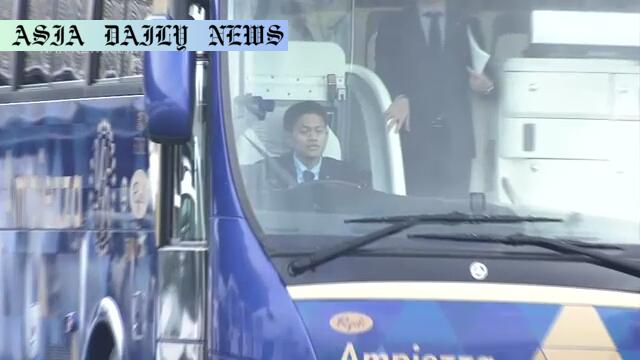Bus Driver: Indonesian Iyus set to become the first foreign bus driver in Japan under the specified skilled worker program.
- First Indonesian, Iyus, becomes a sightseeing bus driver in Japan starting next fiscal year.
- Road transport was added to Japan’s Specified Skilled Worker category in 2024.
- Iyus is the only person to pass Japan’s bus driver eligibility test in December.
- The initiative aligns with Japan’s commitment to meeting rising demand from international tourists.

Introduction of a New Era in Japanese Transportation
In a remarkable development, Iyus, a 40-year-old man from Indonesia, is set to become Japan’s first-ever foreign bus driver under the country’s Specified Skilled Worker (SSW) program. This milestone is significant as it marks an expansion of industries under the SSW initiative, which now includes the road transport sector. His induction into Japan’s workforce reflects a systematic shift towards integrating foreign professionals to meet domestic demands.
Expansion of Japan’s Specified Skilled Worker Program
Japan has been updating its immigration policies to address labor shortages in key industries. The revision of immigration control laws last year opened doors for international workers in road transportation, including taxis and buses. Previously, sectors such as agriculture, nursing, and construction were prominent under the SSW category. This expansion is a response to a growing need for tourism infrastructure, fueled by a steady surge of overseas visitors following Japan’s reopening to the world after the COVID-19 pandemic.
The Road Transportation Sector Joins the SSW Program
The inclusion of road transportation into Specified Skilled Worker No.1 underscores Japan’s recognition of its evolving labor market and demographic challenges. The program, designed to allow foreign workers skilled in specific industries to gain employment in Japan, started with other industries but gained traction with this landmark decision. To qualify for the SSW visa, candidates must pass stringent tests in both skill and language, proving their competency to work in Japan’s professional sectors.
Iyus: The First Foreign Bus Driver in Japan
Iyus’s story is a testament to perseverance and ambition. Out of all the candidates who appeared for the eligibility test conducted in December of last year, he was the only one to qualify in the bus driver category. Iyus’s achievement is expected to make him a trailblazer in a domain traditionally dominated by locals. His new role as a sightseeing bus driver will put him at the forefront of Japan’s commitment to providing exceptional service to international tourists.
Impact on Tourism and Local Workforce
The integration of foreign nationals like Iyus into Japan’s workforce is not only a solution to labor shortages but also an enhancement of service quality—especially important in a country renowned for its hospitality. With the tourism industry witnessing a renewed boom post-pandemic, professionals like Iyus are instrumental in addressing the growing demands for skilled transport services. Companies like Ryobi Group are optimistic that this development will help diversify and elevate customer experiences for international visitors.
A Win-Win Initiative for Both Sides
For Japan, this initiative represents a step toward sustainable solutions to its aging society and declining workforce. For international workers like Iyus, it offers an opportunity to acquire professional skills in a globally respected environment. The visa program also promotes multiculturalism and strengthens Japan’s reputation as an inclusive, welcoming destination for both tourists and professionals.
Future Outlook
The success of this program in the road transportation sector is likely to set a precedent for further expansions. Other industries may follow suit, creating diverse opportunities for international workers in Japan. For now, Iyus’s journey symbolizes hope and the beginning of a broader cultural exchange that benefits individuals, organizations, and nations alike.
Japan is embarking on a transformational path, welcoming diverse talents to contribute to its prosperous future while upholding its commitment to safety, quality, and service.



Commentary
A Historic Milestone for Japan’s Transportation Industry
The integration of foreign professionals into traditionally localized industries is a noteworthy development. Iyus, as the first-ever foreign sightseeing bus driver in Japan, signifies not only achievement on an individual level but also a broader, positive trend reflecting inclusivity and practicality as Japan addresses its workforce shortages.
Impact on Tourism and Customer Experiences
This development couldn’t come at a better time for Japan’s tourism industry, which continues to thrive post-pandemic. The inclusion of non-Japanese workers like Iyus in critical roles like transportation service is likely to cater better to international audiences. It demonstrates Japan’s adaptability and continued focus on offering the highest standards of hospitality to a diversified pool of travelers.
Broader Implications of Foreign Workforce Integration
The move also has broader implications for Japan’s social and economic landscape. By welcoming skilled foreign workers, Japan not only addresses its labor shortages but also paves the way for cultural exchange and global interconnectedness. It reflects a paradigm shift in a traditionally homogeneous society, setting a positive example for other countries facing similar issues.
A Personal Reflection
I am genuinely inspired by Iyus’s journey, from succeeding in a rigorous eligibility test to achieving his dream of becoming a driver in Japan. His story serves as a reminder that determination and opportunity, when combined, can break barriers. I look forward to seeing how Japan continues to evolve its policies and embrace international talent in the coming years.